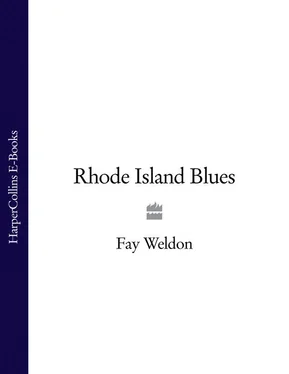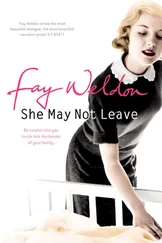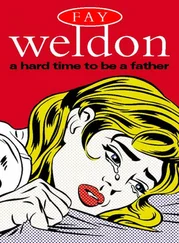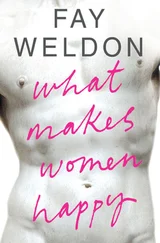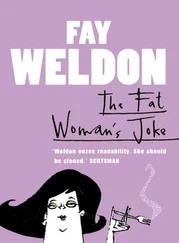Rhode Island Blues
Fay Weldon

Extract from I CHING OR BOOK OF CHANGES translated by Richard Wilhelm, rendered into English by Cary F Baynes (Arkana, 1989) copyright 1950 and 1967 by Bollingen Foundations Inc. Reproduced by permission of Penguin Books Ltd.
Cover Page
Title Page
Excerpt
1
2
3
4
5
6
7
8
9
10
11
12
13
14
15
16
17
18
19
20
21
22
23
24
25
26
27
28
29
30
31
32
33
34
35
36
37
38
39
40
41
42
43
44
45
46
47
48
49
50
51
52
53
WICKED WOMEN
THE CLONING OF JOANNA MAY
DARCY’S UTOPIA
AFFLICTION
About the Author
Also by Fay Weldon
Copyright
About the Publisher
‘I’m old enough to speak the truth,’ said my grandmother, her voice bouncing over the Atlantic waves, ridiculously girlish. ‘Nothing stops me now, Sophia, not prudence, or kindness, or fear of the consequences. I am eighty-five. What I think I say. It is my privilege. If people don’t like what they hear they can always dismiss it as dementia.’
My grandmother Felicity had seldom refrained from speaking the truth out of compassion for others, but I was too tired and guilty to argue, let alone murmur that actually she was only eighty-three, not eighty-five. Felicity spoke from her white clapboard house on a hillside outside Norwich, Connecticut, with its under-floor music system and giant well-stocked fridge, full of uneatable doughy products in bright ugly bags, Lite this and Lite that, and I listened to her reproaches in a cramped brick apartment in London’s Soho. Her voice echoed through an expensive, languid, graceful, lonely, spacious, carpetless house: she kept the doors unlocked and the windows undraped, squares of dark looking out into even blacker night, where for all anyone knew axe murderers lurked. My voice in reply lacked echo: here in central London the rooms were small and cluttered and the windows were barred, and thick drapes kept out the worst of the late-night surge of noise as the gay pubs below emptied out and the gay clubs began to fill. I felt safer here than I ever did when visiting Felicity on her grassy hillside. A prostitute worked on the storey below mine, sopping up any sexual fury which might feel inclined to stray up the stairs, and a graphic designer worked above me, all fastidious control and expertise, which I liked to think seeped downwards to me.
Mine was a fashionable, expensive and desirable address for London. I could walk to work, which I valued, though it meant pushing my way through crowds both celebratory and perverse: the tight butts of the sexually motivated and the spreading butts of gawking tourists an equal nonsense. Was there no way of averaging them out, turning them all into everyday non-loitering citizens? But then you might as well be living in a suburb, and for my kind of person that meant the end.
I was tired because I had just got back from work, and it was late at night. I was guilty because it was two weeks since my grandmother’s noisy friend and neighbour Joy—neighbour in the sense that their two great lonely houses were just about within hailing distance—had called me to shout down the line that Felicity, who lived alone, had had a stroke and was in hospital in Hartford. I had a deadline to meet. I am a film editor. There comes a certain point in a film production when the editor ceases to be dispensable: when you just can’t afford to be ill, go insane, have a sick grandmother. Joy’s call came at just such a moment. You have to be there in the editing suite and that’s that. There are things in your head which are in nobody else’s. Tomorrow was a feature film, a US/UK co-production with pretensions, a big budget, a big-time director (Harry Krassner), and a host of marketing people now hovering and arranging PR and previews, while I still struggled under pressure of time to make something erotic out of not-enough footage of teenage copulation which neither party had seemed to go to with much pleasure. I did not fly to my grandmother’s side. I simply forgot her until I could afford to remember her. Now here she was again, her suppertime my bedtime, not that she ever acknowledged a difference in time zones if she could help it.
I gritted my teeth. Sometimes the ghost of my mad mother stands between myself and Felicity, damming up the flow of family feeling; a sepulchral figure, like one of those school-crossing ladies who step out unexpectedly into the road to let the children through, making the traffic squeal to an unwilling halt.
I had a recurring dream when I was small in which my mother did exactly that, only the sign in her hand read not ‘ Children crossing ’ but ‘ Your fault, Felicity ’. Except I knew that if she ever turned the sign, the other side would have my name on it. It would read, ‘ You’re to blame, Sophia ’. I always managed to wake myself up before I had to face the terror of the other side. I could do that as a child—control my dreams. I think that’s why I’m reckoned to be a good film editor: what is this job of mine but the controlling of other people’s fantasies? I take sleeping pills, most nights: they stop my own dreams. I have enough of them by day to keep anyone sane.
As it happened Felicity had been let out of hospital within the day, having suffered nothing more than a slight speech impediment, which had by now cleared. But I wasn’t to know that at the time.
‘Sophia,’ she was saying, ‘I want to sell this house. The truth is I’m bored to hell. I keep waiting for something to happen but happenings seem to have run out. Is it my age?’ Well, come the eighth decade I daresay ‘happenings’, by which most women mean love striking out of a clear sky, would indeed run out. Everything must come to an end. She said she was thinking of moving into assisted housing: some kind of old-persons’ community. I said I was not sure this was a recipe for a lively life. She said just because people were old didn’t mean they weren’t still alive. She was going to hold her nose and jump: the house was already on the market, she was already selling bits and pieces in the local flea markets, there were some family things I might want to have, and if so I had better come over and claim them.
I felt the tug of duty and the goad of guilt and the weight of my ambivalence: all the emotions, in fact, commonly associated with dealing with family. She being my only relative, I felt the burden more acutely. I loved her. I just wanted her far away and somewhere else. And if I were to read my own behaviour finely, it was worse than this.
As I’d callously worked on after Joy’s first phone call, resisting the notion that in the face of death all things to do with life should pause, I knew that if Felicity would only just die the issue of fault would be set to rest, forever unresolved. I could just be me, sprung out of nowhere, product of my generation, with the past irrelevant, family history forgotten, left to freely enjoy the numerous satisfactions of here and now, part of the New London Ciabatta Culture, as the great Harry Krassner was accustomed to describing it.
Myself, Sophia King, film editor, living day-by-day in some windowless room with bad air conditioning and the soothing hum of computerized technology, but free of the past. Easier by far to make sense of Harry Krassner’s uneven footage than of real life, to let images on film provide beginnings, middles, ends and morals. Real life is all subtext, never with a decent explanation, no day of judgement to make things clear, God nothing more than a long-departed editor, too idle to make sense of the reels. Off to his grandmother’s funeral mid-plot, no doubt.
Читать дальше
